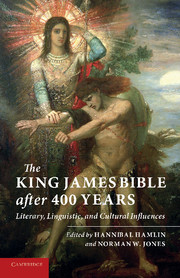Book contents
- Frontmatter
- Contents
- List of Figures
- List of Illustrations
- List of Contributors
- Acknowledgments
- Introduction
- Part I The Language of the King James Bible
- Part II The History of the King James Bible
- Part III Literature and the King James Bible
- 8 Milton, anxiety, and the King James Bible
- 9 Bunyan’s biblical progresses
- 10 Romantic transformations of the King James Bible
- 11 Ruskin and his contemporaries reading the King James Bible
- 12 To the Lighthouse and biblical language
- 13 The King James Bible as ghost in Absalom, Absalom! and Beloved
- 14 The King James Bible and African American literature
- 15 Jean Rhys, Elizabeth Smart, and the “gifts” of the King James Bible
- Chronology of major English Bible translations to 1957
- Chronology of English Bible translations since 1957
- Select bibliography on the King James Bible
- Index of Bible quotations
- General index
- References
13 - The King James Bible as ghost in Absalom, Absalom! and Beloved
Published online by Cambridge University Press: 05 May 2014
- Frontmatter
- Contents
- List of Figures
- List of Illustrations
- List of Contributors
- Acknowledgments
- Introduction
- Part I The Language of the King James Bible
- Part II The History of the King James Bible
- Part III Literature and the King James Bible
- 8 Milton, anxiety, and the King James Bible
- 9 Bunyan’s biblical progresses
- 10 Romantic transformations of the King James Bible
- 11 Ruskin and his contemporaries reading the King James Bible
- 12 To the Lighthouse and biblical language
- 13 The King James Bible as ghost in Absalom, Absalom! and Beloved
- 14 The King James Bible and African American literature
- 15 Jean Rhys, Elizabeth Smart, and the “gifts” of the King James Bible
- Chronology of major English Bible translations to 1957
- Chronology of English Bible translations since 1957
- Select bibliography on the King James Bible
- Index of Bible quotations
- General index
- References
Summary
In typical ghost stories, the first convincing sign that an actual ghost might be present creates a transformation: it takes an otherwise familiar world and makes it unnervingly and catalytically strange. Sigmund Freud described this sense of familiarity-turned-strange as the uncanny – the unheimlich that confronts us with something disturbingly unfamiliar hidden in what seems familiar, the heimlich. Thus the ghost of Jacob Marley appears and unsettles Ebenezer Scrooge, thereby preparing him to revise what he thinks he knows about his world and what he values most: before he takes a fantastical journey through Christmases past, present, and future, Ebenezer must first come to terms with the very existence of the ghost, which does not accord with his beliefs about the world. Likewise, the ghost of Hamlet’s father sets the play in motion not by revealing a “murther most foul” but, as the opening scene emphasizes, by first challenging Horatio’s general system of beliefs with his mere presence: in Hamlet’s words, the existence of a ghost suggests “there are more things in heaven and earth, Horatio, / Than are dreamt of in your philosophy.” Arguably, the most successful ghost stories don’t merely depict a character’s experience of the uncanny; they actually create such an experience for many of their readers or audience members.
Two of the most widely acclaimed novels of the twentieth century tell this kind of profoundly uncanny ghost story. Often considered their Nobel-prize-winning authors’ respective masterpieces, William Faulkner’s Absalom, Absalom! and Toni Morrison’s Beloved are ghost stories of a hauntingly unconventional kind. At the center of each novel’s strange-making representational strategies is the King James Bible (KJB) – so much so that, as I elaborate below, the KJB itself haunts these novels as much as any other ghost. Yet the KJB does not merely haunt them. More than that, it defines what it means to be haunted in these novels. Specifically, the KJB helps define the implicit sense conveyed by these novels that the present is inescapably haunted by the past, which is to say that the word history names a ghost, as it were, a ghost that constantly threatens to render the present unsettlingly and perhaps catalytically strange to itself.
- Type
- Chapter
- Information
- The King James Bible after Four Hundred YearsLiterary, Linguistic, and Cultural Influences, pp. 269 - 293Publisher: Cambridge University PressPrint publication year: 2010



